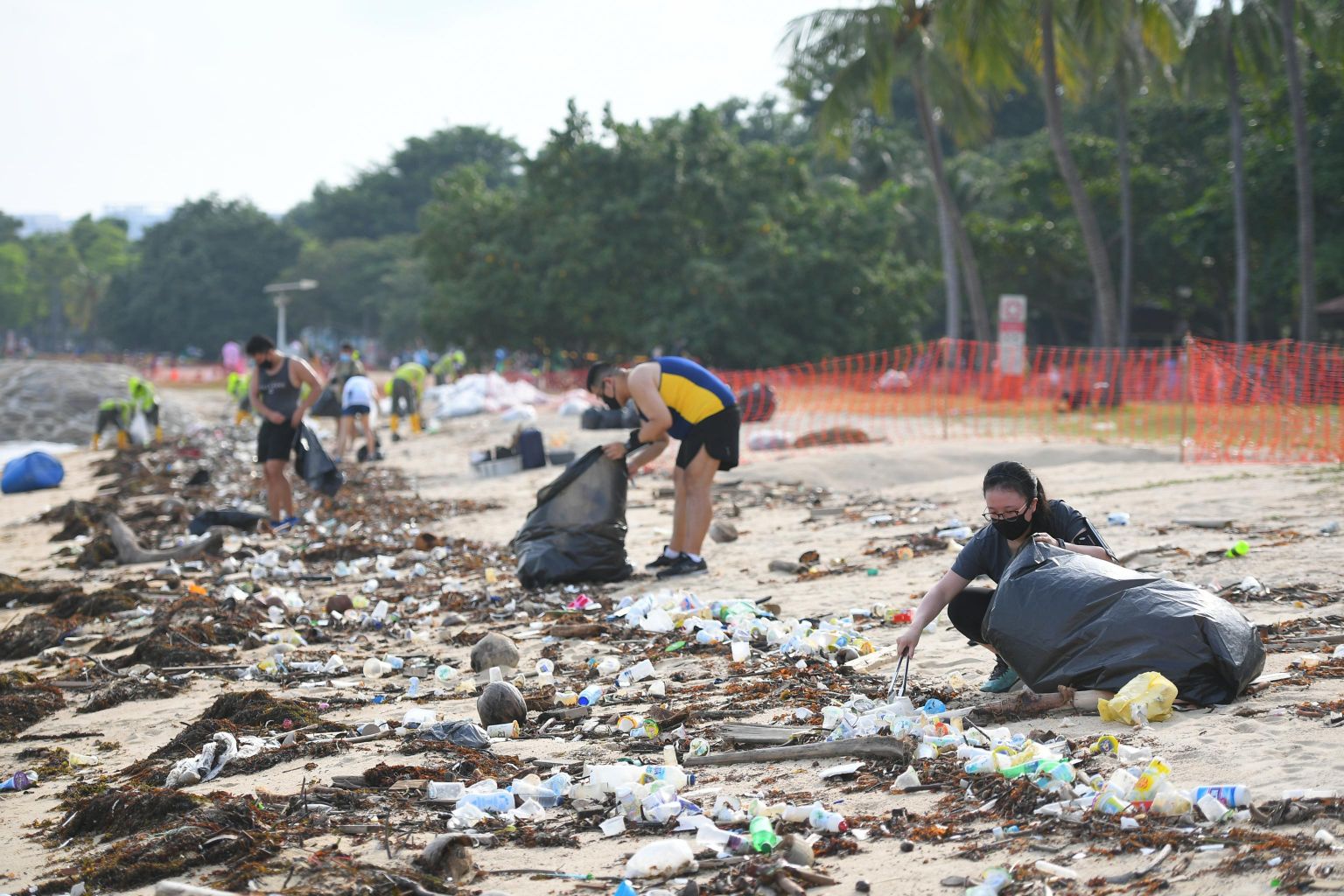National framework to tackle marine litter expected to be out next year
Sign up now: Get ST's newsletters delivered to your inbox

Volunteers picking up trash at East Coast Park on July 31, 2020.
PHOTO: ST FILE
SINGAPORE - Singapore is working on a framework to shore up defences against marine litter to protect its coastline and waters surrounding the island.
The framework - called Singapore's National Action Strategy on Marine Litter - is expected to be ready by the middle of next year, said the Ministry of Sustainability and the Environment (MSE) on Friday (Oct 1).
The initiatives to tackle the issue will be consolidated in this framework, which various government agencies will help to develop.
"These measures will be tailored to our context and needs, and guided by the core principles of sustainable development and a circular economy approach," said MSE.
Work on the framework kicked off on Thursday (Sept 30), when Minister of State for Sustainability and the Environment Desmond Tan hosted a virtual dialogue. The 40 participants included academics, organisations and members of the public.
MSE said the dialogue covered the strengths and gaps in Singapore's current approach to tackling marine litter, and how everyone can work together to improve the situation.
In a Facebook post on Thursday, Mr Tan said: "As a small tropical island, Singapore has not been spared the impacts of marine litter, which regularly wash up on our shores especially during monsoon seasons."
Studies have found that 80 per cent of marine litter come from land-based sources, and the transboundary nature of the debris adds to the complexity of the challenge, he added.
"Many of our community groups have been heavily involved in ground-up initiatives, to actively clean up our beaches and raise awareness of the marine litter issue in Singapore.
"Domestically, we are committed to tackle the issue, including through our comprehensive waste management approach."
During Thursday's dialogue, MSE received feedback from participants on what the framework would look like.
"We will review the feedback and recommendations... to incorporate in the National Action Strategy, and explore the implementation of feasible solutions in collaboration with relevant stakeholders," it said.
At the regional level, Asean launched a five-year action plan for combating marine debris in May this year. Singapore has worked closely with Asean to adopt the plan, added Mr Tan.
Solutions outlined in the plan include having guidelines for countries to phase out single-use plastics, harmonising regional policies on recycling and plastic packaging standards, and better monitoring of marine debris in the region.
In August, it was announced that the National Environment Agency (NEA) will undertake a two-year study to understand the amount and movement of marine litter and microplastics in the waters in and around Singapore.
In Parliament that month, Mr Tan said NEA cleared an average of 3,500 tonnes of marine debris annually for the past two years.
The Maritime and Port Authority of Singapore further collected about 1,000 tonnes of debris from the sea each year.
The north-east and south-west monsoon periods every year tend to bring in more rubbish to Singapore's shores.
Cups, bottles and styrofoam containers, among other trash, are carried to beaches through natural tidal waves.
Marine trash has wide-ranging impacts on the environment, wildlife, health and tourism, among other areas.
According to the International Union for Conservation of Nature, the "most visible and disturbing impacts of marine plastics" are when sea creatures mistake the trash for prey, which leads to suffocation and internal injuries. Turtles and fish also get ensnared and entangled by debris.
In August last year, East Coast Park saw a 90 per cent increase in the amount of trash collected, compared with other times of the year - due to the south-west monsoon, which causes winds to blow from the south or south-east.
WWF-Singapore senior technical policy adviser Alison Budden said: "Asia is significantly impacted by the plastic pollution crisis, and WWF hopes to see the National Action Strategy championing a circular economy approach locally and internationally... and close the tap of plastic litter into our oceans.
"Production and trade in plastic raw material are transboundary and plastic pollution cannot be solved through national or regional initiatives alone. Further, voluntary measures are not sufficient."
Ms Faith Tan, who founded SG Beach Warriors - a community that organises beach cleanups, hopes that the new framework will outline ways to help neighbouring countries with their waste management.
Having rolled out beach cleanups since 2019, she has seen items such as refrigerators, toilet bowls, televisions and mattresses land on Singapore's shores.
Ms Tan, 50, said: "This year, I noticed more marine litter in many places including Yishun Dam, Coney Island and mangrove areas. The variety has increased too, with more e-waste such as TVs, batteries and light bulbs.
"There were more ghost nets (that have been left or lost in the sea by fishermen) and thick long ropes, and more household items on top of the usual plastic trash. During the monsoons, the trash became worse."


